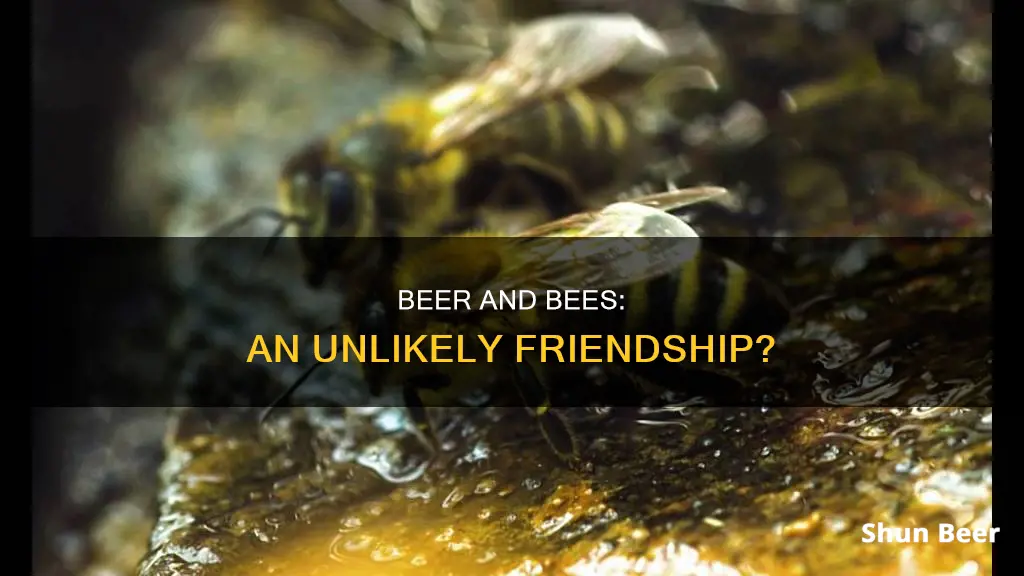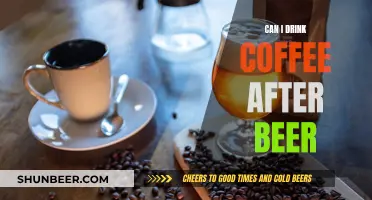
Bees are known to drink fermented nectar or sap, which can make them drunk. In fact, bees can ingest large amounts of pure ethanol—the equivalent of a human drinking 10 litres of wine in one sitting. This alcohol consumption has similar effects on bees as it does on humans, including impaired motor functioning and memory processing. Drunk bees may be ejected from the hive by guard bees, who will often remove their wings and legs. Scientists are studying bees to better understand the effects of alcohol on humans and to develop new drugs to treat alcoholism.
| Characteristics | Values |
|---|---|
| Do bees drink beer? | Yes, bees can drink beer. They can also drink pure ethanol. |
| Why do bees drink beer? | Bees are attracted to the sugar in alcoholic drinks. |
| How does beer affect bees? | Bees can get drunk and experience hangovers, impaired memory and motor functioning, and aggression. |
| How do bees get drunk? | Bees can get drunk by consuming fermented flower nectar, tree sap, or sugary alcoholic drinks. |
| What happens to drunk bees? | Drunk bees may be punished or banished by other bees in the hive. They may have their legs or wings removed, or be left unable to find their way home. |
| Can bees be used to study alcoholism? | Yes, bees are being used to test anti-alcoholism drugs and study the effects of alcohol. |
What You'll Learn

How do bees get drunk?
Bees can get drunk by consuming fermented flower nectar or tree sap. In the summer heat, nectar can begin to ferment and create ethanol, which bees will then ingest and fall prey to the same effects as humans when we consume alcohol. Tree sap, such as that of the lime tree, can also ferment under excessive heat, leading to drunk bees.
Rotting apples are another common cause of bees getting drunk. Bees will appear lost, dizzy, and disoriented when consuming too much fermented nectar. They become aggressive, and their foraging and learning abilities are impaired. Their blood ethanol level spikes as they become more intoxicated, and they move much slower. If they are mildly drunk, they continue to fly; if they are very drunk, they sprawl on the ground. If they have consumed a dangerous amount of alcohol, they will lose their way back to the hive and may die.
Drinking is strictly prohibited in the bee world. Inebriated bees that make it back to the hive are punished by the guard bees, who will bite off the drunken bee's legs, leaving it with little chance of survival. This serves as a warning to the rest of the hive, as indulging in any behaviour that takes them away from their duties can lead to their inevitable death.
Beer and Sciatica: Can Drinking Beer Hurt Your Sciatic Nerve?
You may want to see also

What happens when bees get drunk?
Bees, like humans, can get drunk. They do so by ingesting large amounts of alcohol, usually in the form of fermented flower nectar or tree sap. In the summer heat, nectar and tree sap can begin to ferment and create ethanol. Bees that consume this ethanol will experience similar effects to humans when they drink alcohol.
Drunk bees may bump into objects or walls, refuse to fly, or even forget where they were going and get lost. They might appear lost, dizzy, and generally without purpose. They become disoriented, zig-zagging about in the air, until they hit an object and end up sprawled out on the ground. Many die from intoxication.
Drinking is not socially acceptable in bee societies. When drunken bees return to their hives, they are often met with a vicious response from the other bees. Guard bees, tasked with protecting the hive, will act as bouncers and eject drunk bees from the hive's entrance, sometimes removing their wings and legs in the process. This punishment serves as a warning to the rest of the hive, reminding them that work is incredibly important and that indulging in any kind of enjoyment will lead to their inevitable death.
The study of drunken bees can also help scientists better understand the effects of alcohol on humans. Bees have similar molecular brain structures to humans, so studying how ethanol affects their behaviour and memory can provide insights into how alcoholism affects humans. Additionally, bees can be used to test new anti-alcoholism drugs before human trials begin.
Charleston Beer Works: Closest Hotels for a Quick Pint
You may want to see also

Why do bees drink alcohol?
Bees, like humans, can get drunk. They are attracted to fermented flower nectars, sap, gum, fruit punch, and even rotting apples. In the summer heat, nectar can begin to ferment and create ethanol, which bees then ingest and fall prey to the same effects as humans when we consume alcohol.
Honeybees are avid drinkers and can be likened to experts at holding their liquor. They are predisposed to alcoholism and can consume sugars with ethanol concentrations as high as 20%. They will happily drink the equivalent of a human drinking 10 litres of wine in one sitting.
Bees act a lot like humans when they are drunk. Their motor functioning is thrown off, and their memory processing is impaired. They may appear lost, dizzy, and without purpose, bumping into objects or walls, refusing to fly, or even forgetting where they were going and getting lost.
The reasons why bees drink alcohol are not yet fully understood. However, one possible explanation is that bees, like humans, may experience pleasure or reward from consuming alcohol. This could be due to the activation of certain neurotransmitters in the brain that produce feelings of happiness or relaxation.
Another reason could be that bees, especially those that forage outside the hive, may have evolved to consume alcohol as a way to cope with stress or anxiety. In nature, foragers occasionally encounter ethanol, and consuming it may help them relax or reduce their stress levels.
Additionally, bees may drink alcohol as a way to self-medicate. Ethanol has antimicrobial properties, and bees may ingest it to kill any harmful bacteria or parasites they may be carrying.
Finally, bees may drink alcohol inadvertently. They are attracted to sweet substances, and fermented nectars or fruits can be especially appealing. Bees may not be able to distinguish between fresh and fermented nectar, especially if the fermentation is in its early stages and the ethanol concentration is still low.
The behaviour of honeybees and their predisposition to alcoholism could hold the key to future studies of alcohol addiction. Researchers have found that bees can develop a dependence on alcohol and experience withdrawal symptoms when it is taken away. This makes them ideal subjects for testing new anti-alcoholism drugs and understanding the effects of alcohol on the brain.
Exploring the Legal Drinking Age: Beer and the Law
You may want to see also

How do bees process alcohol?
Bees can indeed get drunk, and they process alcohol in a similar way to humans. Ethanol, the intoxicating substance in alcohol, is formed when yeast interacts with the sugars in nectar to ferment it. Bees can drink ethanol when yeast interacts with the sugars in nectar to form ethanol, essentially turning the nectar into alcohol.
Nectar is most likely to ferment when it has a high water content, so rainfall or humidity can cause the nectar to become more susceptible to fermentation. Warmer temperatures are also more conducive to fermentation, so bees are most likely to become intoxicated when the weather is both warm and moist.
Bees can develop a tolerance to alcohol, in the same way that humans do. They can develop both metabolic and functional tolerance. Bees with metabolic tolerance can absorb alcohol more slowly and remove it from their bodies quicker, while functional tolerance occurs when the nervous system enhances an individual bee's ability to function even when exposed to alcohol. Bees that have consumed alcohol previously will have greater resistance to its effects and will be less impaired than those that have never consumed it.
Bees can also experience withdrawal symptoms when alcohol is removed from their food. In a study, worker bees that were fed alcohol-spiked food experienced a "marked" increase in consumption of ethanol as well as a slight increase in mortality when access to the solution was discontinued. They also exhibited behaviours similar to alcohol-intoxicated humans, including impaired locomotion, foraging and learning.
Bees that get drunk are rejected by their colony and cannot return to their hive. Drunk bees are not coordinated enough to keep themselves safe from nature or predators, which is why their expulsion from the colony often leads to their death.
Arymina and Beer: A Safe Mix?
You may want to see also

How is the study of bees and alcohol helpful to humans?
Bees are essential for the health of people and the planet. While bees are valued for their honey, they are also recognised for their importance in promoting food security and variety in plants and animals. The study of bees and alcohol can be helpful to humans in several ways. Firstly, bees can be used as a model for studying alcohol addiction and its effects on the human body. Alcohol has similar effects on bees as it does on humans, and bees are predisposed to alcoholism. This makes them ideal research subjects for understanding the impact of alcohol on behaviour, memory, and addiction. Additionally, bees can be used to screen new compounds for potential drugs to treat alcoholism, providing a low-cost organism for drug companies to work with.
Secondly, the study of bees and alcohol can provide insights into the social context of alcohol consumption. Honey bees are highly social animals, and observing their behaviour when intoxicated can help researchers understand how alcohol affects social interactions. This can potentially lead to a better understanding of human social behaviour when drinking alcohol, including aggression and other social dynamics.
Thirdly, studying the effects of alcohol on bees can offer insights into the molecular and genetic basis of alcoholism. The honey bee nervous system and brain have similar functions to those of vertebrates, including humans. By understanding how alcohol affects genes and proteins in the honey bee brain, researchers may eventually be able to comprehend how alcoholism impacts memory and behaviour in humans at the molecular level.
Lastly, the study of bees and alcohol can contribute to the development of emergency plans for human populations. Bees are very intelligent, and their mannerisms and social interactions have inspired human initiatives. For example, researchers suggest that studying bee behaviour could inform strategies for evacuating people from overcrowded environments. Therefore, the study of bees and alcohol has the potential to provide valuable insights that can be applied to various aspects of human health, behaviour, and emergency management.
Understanding Beer Shanks: How Do They Work?
You may want to see also
Frequently asked questions
Bees do not drink beer, but they do drink ethanol. They are the only organism known to drink pure ethanol.
Bees get drunk by drinking fermented flower nectar, sap, or sugary alcoholic drinks. In the summer heat, nectar and sap can begin to ferment and create ethanol.
Drunk bees act a lot like drunk humans. Their motor functioning is thrown off, and their memory processing is impaired. They may bump into objects, refuse to fly, or get lost. Drunk bees are often punished by other bees in the hive, who may bite off their legs.
Bees may be predisposed to alcoholism due to the presence of naturally occurring ethanol in nectar. This makes them ideal for research into drugs to treat alcoholism.







